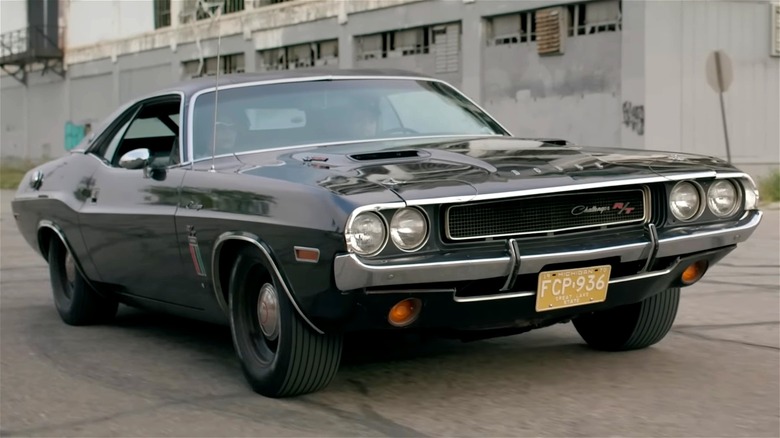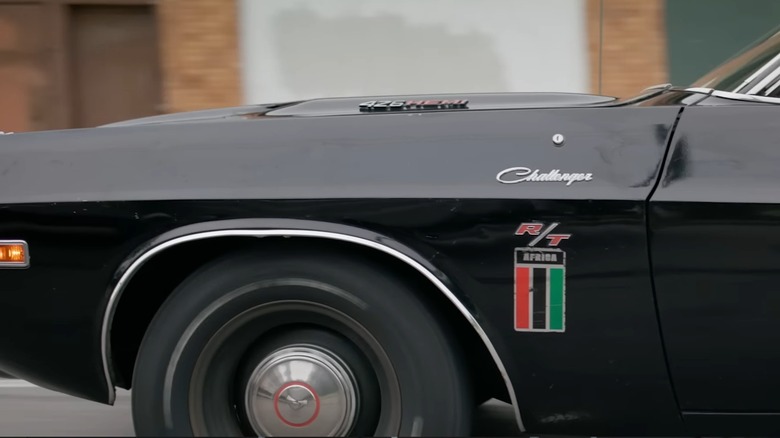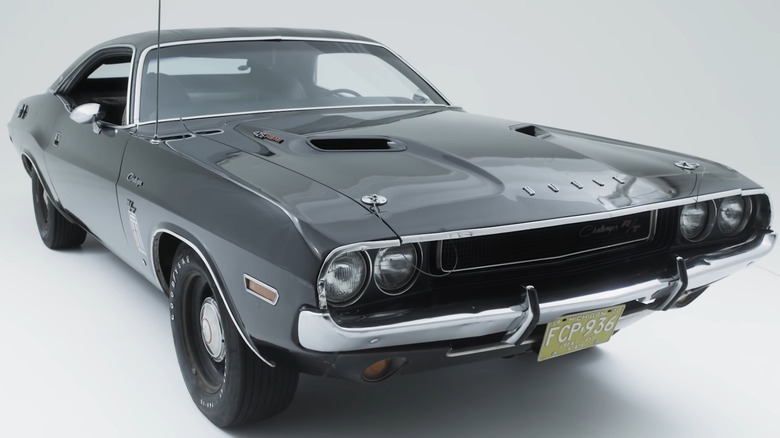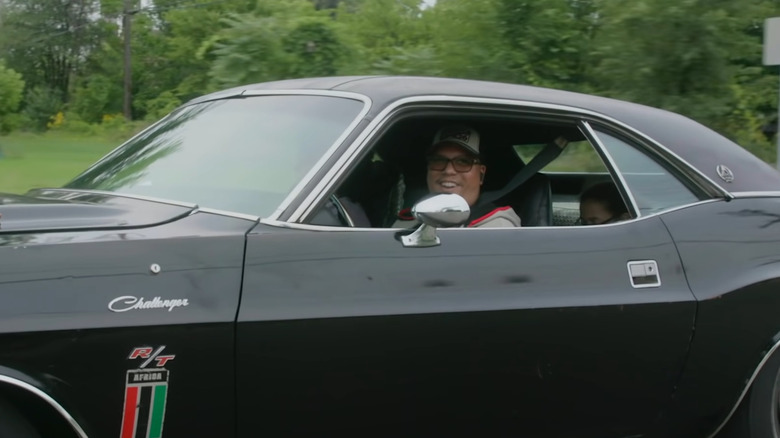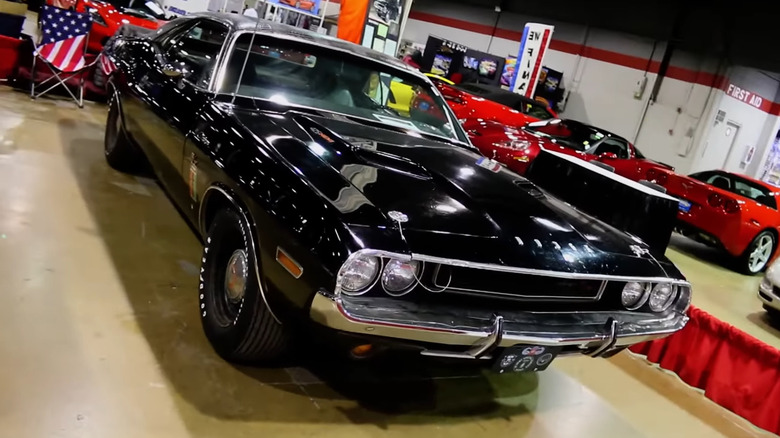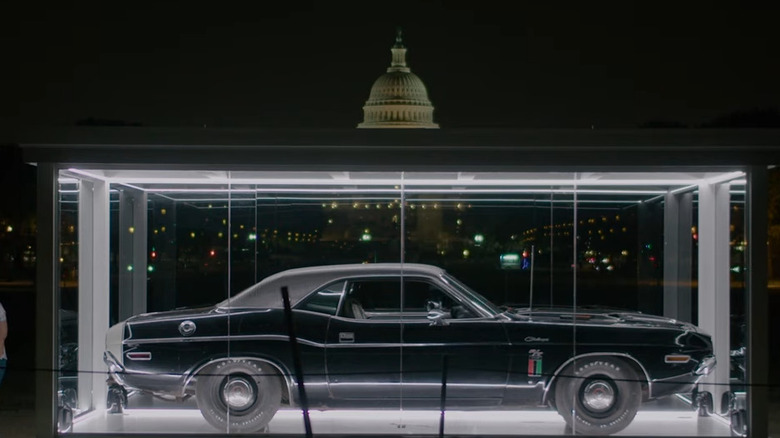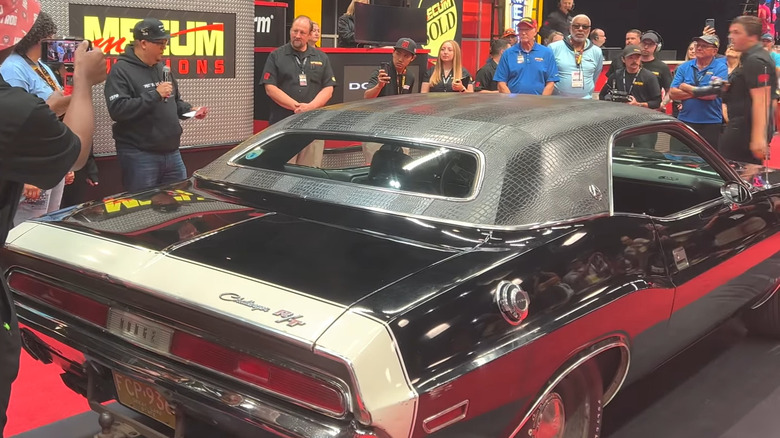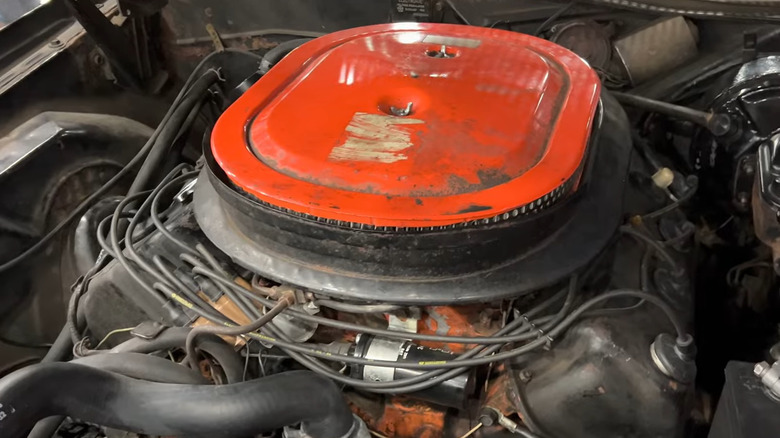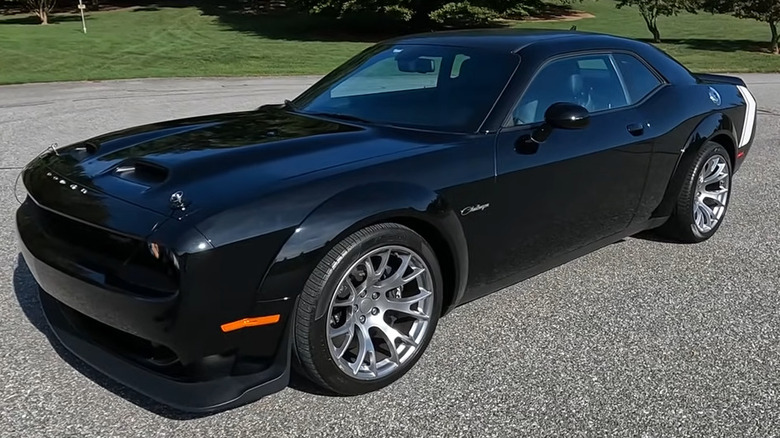Behind The Legend Of The 1970 Black Ghost Dodge Challenger Street Racer
Street racing is as American as baseball or apple pie. Whether it was happening in the Bronx, on California's Van Nuys Boulevard, or on 107th in Chicago, the addiction so many drivers have with speed, customization, and winning has always been part of car culture. This is as evident today as it was in the '60s and '70s -– just look at the box office numbers for the "Fast & Furious" franchise, which has raked in over $7 billion worldwide over 11 films. People take this stuff seriously, and the stories from the past have become as legendary as Dom Toretto's exploits.
In Detroit, Michigan, there was a car that was as mysterious as it was quick off the line. It made an impact the second it pulled up for a race –- a black 1970 Dodge with a Hemi, a gator skin top, and a pair of Africa stickers with red, black, and green vertical stripes under the R/T badging on the fenders. This was the Black Ghost, and between 1970 and 1975, it was an undefeated monster. It was also a mystery, as few knew anything about the car, the driver, or what was going on under the hood of the "Ghost." Until recently, this mystery endured, with many folks feeling that it may just have been an urban legend.
That all changed in 2017 when the heir to the "Black Ghost" shared the car and its story with the world.
The legend of the Black Ghost
Any good drag racing story is filled with bombastic details and crazy police chases, but the Black Ghost's story is unique in the air of mystery that surrounded it for decades. As the legends go, the black Challenger would roll up on popular Detroit street racing locations like Woodward Avenue or Telegraph Road, taking down a number of challengers in illegal drag races before speeding off. Other racers would often gather at local burger joints to discuss cars and the night's races, but the driver of the Black Ghost remained an enigma, choosing to go his own way.
The mysterious status of the driver was heightened because the Black Ghost showed up to race so infrequently. According to the legend, the Challenger would disappear for weeks or months at a time, only to dominate a night of racing before vanishing into the darkness once again. It also never seemed to be there when police showed up to bust the groups of racers, adding to the mystique of the uncatchable, unbeatable Black Ghost.
Just as suddenly as it appeared on the Detroit racing scene in 1970, the Black Ghost disappeared after 1975. There was no fanfare, no retirement. The car that couldn't lose simply stopped showing up. After months had passed, it was clear that the run of the Black Ghost had come to an end.
The Black Ghost – A challenger like no other
In the 21st century, any 1970 Dodge Challenger R/T-SE is a collector's dream in its own right. After all, 1970 was the first model year of the Challenger, which was designed by Chrysler to compete against pony cars like the Mercury Cougar, Pontiac Firebird, and Ford Mustang.
The man who ordered this Dodge was very particular about what he wanted, making this Challenger even more special. The order sheet – which comes from Detroit's Raynal Brothers Dodge dealership — has survived to this day and is evidence of the many options the original owner envisioned for his dream car. A 426 cubic inch Hemi V-8 was chosen over the Magnum or Six-Pack engines that were also available, giving the stock Challenger 425 horsepower to work with. The Super Track Pack added a four-speed manual transmission with a pistol-grip shifter, along with several other upgrades.
While the owner's son has mentioned that his dad didn't initially want it, the gator grain black roof option was accidentally added, and he eventually grew to like the unique look. Other aesthetic options included tinted glass, cotter pins for the hood, a locking gas cap, and a white bumble bee stripe that went across the rear deck and fenders. Overall, the combination of parts selected for this car –- already a rarity, as only 23 Challenger R/T-SE four-speeds were produced for that year -– made it a one-of-one vehicle.
Godfrey Qualls: The Man Behind the Wheel of the Black Ghost
It turns out there was a pretty good reason the driver of the "Black Ghost" had to remain incognito. Godfrey Qualls, known to his friends as GQ, was recognized in his neighborhood as many things, but street racing legend wasn't one of them. He was a veteran who served in the Army's 82nd Airborne Division, where he completed 300 jumps as a paratrooper and returned to the United States with a Purple Heart. He was also a part of the Detroit police force, where he was a motorcycle cop and, outside of his job, a motorcycle enthusiast who maintained a small collection of bikes.
Obviously, his position with the Detroit Police Department made anonymity a priority during Qualls's time spent street racing –- although it does provide an explanation as to why he was never caught by the cops while he was participating in the action. It also says a lot about the man that he chose to retire from his passion when his family began to grow.
Qualls's younger brother, Cleolous "Cle" Qualls, also served in the Army. When he got out, Cle went to the same Raynal Brothers Dodge that his brother would. There, he bought a 1968 Charger R/T, black with a bumble bee stripe and a 440 V-8. Their father was also a Mopar guy, the owner of a black and pink 1955 Dodge Custom Royal with a 270 Super Red Ram V8.
Growing up with the Black Ghost
In 2014, an aging GQ Qualls invited his son, Gregory, to his garage in Detroit. By this time, GQ had survived a 2008 battle with cancer. That was when he revealed the Challenger, which was buried in the garage under some boxes and blankets.
Gregory remembered the car from his childhood and recounted eating dinner one evening when his dad started the car -– which had the mufflers removed –- and it shook the whole house. Another time, GQ put Gregory in the passenger seat of the car with a hundred-dollar bill taped on the dash. GQ told Gregory he could have the hundred if he could grab it and proceeded to hit the gas whenever the kid reached for the bill, throwing him back in his seat.
When cancer attacked GQ again, Qualls asked his son to get the title for his Challenger and signed it over. He either never wanted his son to know about his street racing life, or he never got the chance to tell him the stories. Godfrey Qualls passed away on Christmas Eve in 2015. Gregory Qualls knew the car was special to his dad, but it was never treated like a collector's item –- Gregory recounted several dents he'd made on the Challenger's door with his bike handles, and without any context, he just knew it as his dad's loud car.
This all changed once Gregory got the Black Ghost up and running.
A resurgence in popularity
The story of the Black Ghost was never forgotten, especially around Detroit, but the tale was brought to national attention in 2017 when Gregory Qualls showed the car in Rosemont, Illinois, at that year's Muscle Car and Corvette Nationals event. Gregory had shown the car at some smaller shows before that, in the process learning from Detroit locals who knew the car and the legends surrounding it. That's how Gregory learned about his old man's adventures building the street racing legend of that unique Challenger –- not from Godfrey himself, but from other racers who witnessed the Black Ghost in action.
Gregory went on to show the car several times at shows all over the country, gaining notoriety for the vehicle and, in the process, getting Godfrey "GQ" Qualls the recognition his son felt his dad deserved. Gregory even got to present the Black Ghost as part of the Woodward Dream Cruise, the nation's largest one-day automotive event –- which happens to take place on the same street on which GQ raced over sixty years ago.
An appearance at Detroit's Autorama show in 2018 led to more stories about GQ, as well as an invite to the Carlisle Chrysler Nationals later that year. A chance meeting at that event would lead to the Black Ghost becoming an official part of American automotive history.
Induction to the National Historic Vehicle Register
While showing the Black Ghost at the Carlisle Chrysler Nationals in Pennsylvania, Gregory Qualls met Casey Maxon, the historian for the Historic Vehicle Association. That group, now known as the Hagerty Drivers Foundation, helped to found the National Vehicle Registry, a collaboration between the United States Department of the Interior and the Hagerty Drivers Foundation that began in 2013. It is "... the only Federally recognized program that records the history of America's most significant automobiles, preserving their information in perpetuity at the Library of Congress," the Hagerty Drivers Foundation explains.
In the 10 years since its inception, the Registry has inducted 34 vehicles. Those vehicles include the iconic pink 1964 Chevy Impala known as the Gypsy Rose, one of the most popular lowriders ever made, and the 1981 De Lorean DMC-12 made famous in the 1985 blockbuster "Back to the Future." In 2020, the Black Ghost became the 28th car to be added to the National Historic Vehicle Register. The induction coincided with the 50th anniversary of the Dodge Challenger, and the car was even displayed on the National Mall in Washington, D.C. as part of its addition to the Registry.
The auction of the Black Ghost
After traveling with the "Black Ghost" for six years and appearing at dozens of shows, Gregory Qualls made the decision to sell the car. As a single-family vehicle, a 1970 Challenger survivor car – basically an unrestored, unmodified collector car — with nearly every bit of paperwork that came with its purchase was going to get a great price at auction, regardless of its history. Of course, the storied drag racing history of the Black Ghost, its status as part of the National Historic Vehicle Register, and Godfrey's service to his nation and community helped to raise the value of this unique collector's vehicle.
The decision to sell couldn't have been an easy one. Gregory has presented conflicting retellings as to whether Godfrey Qualls told his son, "Don't give my f***ing car away," or, "Don't sell my f***ing car!" when he signed the Challenger's title over, but in the end, it was Gregory Qualls' property to do with as he wished. The promise of a potential million-dollar sale couldn't have hurt -– that's nearly 10 times the price tag of a comparable Charger.
Money like that can be life-changing – as Gregory Qualls said in an interview with Hagerty, "The main reason is it's a chance to help my family, to give them opportunities they may not have otherwise." On May 19, 2023, the 1970 Dodge Challenger R/T-SE known as the Black Ghost was sold to a private collector for $975,000.
Controversy surrounding the Qualls Challenger
Several naysayers have come forward since the Black Ghost achieved mainstream attention following its 2017 Muscle Car and Corvette Nationals showing, growing even louder when it was announced that the car was going to be auctioned off. Some say the car couldn't possibly have contended with other street racers of the time, while others are angry that Gregory Qualls would have considered selling his dad's car at all.
Claims that this particular Challenger couldn't have terrorized the streets of Detroit over a half-century ago abound, with negative comments on nearly every article or video featuring the Black Ghost. Many point out that a stock 1970 Challenger, even one with the most powerful Hemi engine that was available for it at the time, wouldn't have stood a chance against some of the other well-known cars in Detroit's legendary street racing scene.
However, some new information may be forthcoming in that area. The new owner of the Black Ghost sent the car to Virginia, where it will be restored using only original parts to maintain its survivor car status. When he began working on it, shop owner Frank Badalson mentioned that there were indications that the 426 Hemi had been modified at some point with headers, fuel system upgrades, an aftermarket camshaft, aftermarket valve springs and lifters, and an aftermarket ignition system.
An observation like that, provided by a professional with hundreds of Mopar rebuilds under his belt, might be enough to make someone believe in ghosts.
Honoring the Legend: The 2023 Dodge Challenger Black Ghost Special Edition
As part of its Last Call series of Challengers -– SlashGear has reviewed the Dodge Challenger Swinger and the obscenely powerful Dodge Challenger SRT Demon 170 in that lineup –- Dodge created an appearance package based on the legendary "Black Ghost" for the 2023 model year.
A variation on the SRT Hellcat Redeye Widebody, this Challenger sports over 800 horses under the hood along with special badging, a reimagining of the bumblebee deck lid stripe, and even the black "gator skin" vinyl roof of its namesake. It's loud, powerful, and looks great -– and with future Hellcats going electric, this line of Challengers definitely represents the end of an era. It features a 6.2-liter Hemi V8 that outputs 807 horsepower and 707 lb-ft of torque.
Only 300 of these tribute vehicles were produced with an MSRP of $103,010; however, one should be prepared to pay over twice that amount on the aftermarket for the 2023 version of the Black Ghost. Whether that's worth the steep price tag or not is entirely subjective, but to us, the Last Call version of the "Black Ghost" is a fitting tribute to both Godfrey Qualls' legacy and his mythical car –- and a great send off to the celebrated Dodge Challenger.
